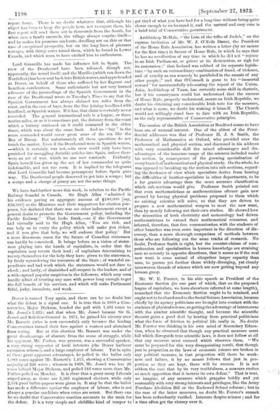Dover is turned Tory again, and there can be no
doubt but what the defeat is a signal one. It is true that in 1868 a Con- servative, Major Dickson, headed the poll with 1,461 votes to Mr. Jessel's 1,435 ; and that when Mr. Jessel became Sir G. Jessel and Solicitor-General in 1871, he gained his victory over Mr. Barnett (who is now successful) only because the leading Conservatives turned their face against a contest and abstained from voting. But at this election Mr. Barnett was under the great disadvantage of absence from the scene of struggle, while his opponent, Mr. Forbes, was present, was a successful speaker, a very strong supporter of local interests (the Dover harbour extension scheme), and a large employer of labour. Yet in spite of these great apparent advantages, he polled in the ballot only 1,089 votes against Mr. Barnett's 1,415, showing a Conservative majority-of 326 votes ; whereas in 1868, Mr. Jessel was but 26 votes behind Major Dickson, and polled 346 votes more than Mr. Forbes polled on Monday. It is clear that a great many Liberals stayed away, as there are 3,563 registered electors, while only 2,504 good ballot-papers were given in. It may be that the ballot has made a difference against the employer of labour, who is not always a popular candidate when votes are sebret. But there can be no doubt that Conservative reaction accounts in the main for the defeat. It is a very simple and childlike kind of temper to
get tire I of what you have had for a long time without being quite clever enough to understand it, and th'e- natural and easy cure is a brief trial of Conservative goverinnent.


































 Previous page
Previous page